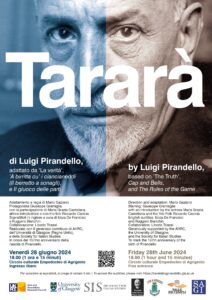On 28 June 2024, the Circolo Empedocleo in Agrigento, Sicily, welcomed Dr Enza De Francisci, Senior Lecturer in Translation Studies at Glasgow University, to introduce her project, ‘Translating Pirandello in Agrigento: City of Culture (2025)’, funded by the Arts and Humanities Research Council’s Impact Acceleration Account in collaboration with Glasgow University.
As Agrigento becomes Italys City of Culture in 2025, the project, in partnership with the Pirandello Stable Festival theatre company directed by Mario Gaziano, is reflecting on the need to make theatre productions more accessible for in-coming audiences. To support this, the project is maximising the opportunity of the City of Culture celebrations by producing new English surtitles around the Sicilian play, Tararà, with excerpts adapted from ‘La verità(1912)’, A birritta cu i ciancianeddi (Il berretto a sonagli, 1916), and Il giuoco delle parti (1918) by Nobel-Prize winning author, Luigi Pirandello (1867-1936). The resources aim to offer an innovative model for safeguarding vulnerable languages. While lesser-spoken languages tend to be dethroned by ‘dominant’ languages in translation processes, the surtitles allow wider audiences to follow the performances in the original language without erasing it from the stage, in this case: protecting the use of Sicilian (considered a “vulnerable language by UNESCO).
The performance was generously sponsored by the Society for Italian Studies. We are also grateful to Professor Davide Messina from Edinburgh University for discussing how he disseminates the study of Italian cultural history in the UK, and to Professor Lisa Sarti from the City University of New York for speaking about the way she promotes the study of Pirandello in the US.
Giuseppe Gramaglia’s performance was – remarkably – in line with the English surtitles produced by De Francisci and her Research Assistant, Ruggero Bianchin. To accompany the performance, bilingual theatre programmes were distributed to spectators to help contextualise the play, which revolves around the character, Tararà, who murders his cheating wife not out of jealousy, but because of the inexorable occhio della gente who see and know of her betrayal, and who he must therefore inexorably kill. He shouts in a conflicted and feverish manner: “Signor iudici iu ci vuliva beni(Your Honour, I loved her).
Indeed, with Tararà we wished to draw attention to how theatre can be used to safeguard against femminicidio. It has been estimated that there are approximately 150 cases of femminicidio in Italy per year. A similar endemic has emerged in Scotland, with a recent 60% increase in the number of women killed each year. Our ambition here was to promote public awareness of how an endangered artform like Sicilian dialect theatre can be used to the protection of minoritized groups and genders.
To conclude, all participants, including Fabrizio La Gaipa (Director of the Tourist Board Valle dei Templi), Professor Stefano Milioto (Emeritus Professor of the Centro nazionale studi Pirandelliani), Professor Franco Curaba (Director of the Cultural Association Serroy), and the writer Alfonso Gueli, joined the Trio Folk band led by Peppe Sciortino for a celebratory end.

